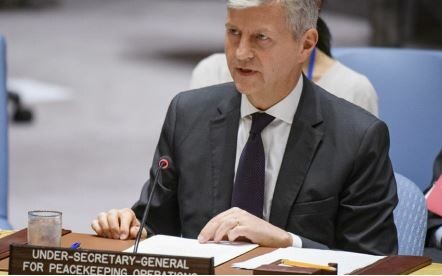While South Sudan is not currently ready to hold elections later this year, they can still take place before the end of the transition period, a senior United Nations official told the UN Security Council on Tuesday, as speakers discussed the support necessary for the polls to happen amid increasing internal and external challenges.
“A myriad of factors will likely affect elections in South Sudan,” reported Jean-Pierre Lacroix, Under-Secretary-General for Peace Operations, highlighting intensified fights over resources, high unemployment, political competition among the ruling elite, increased intercommunal clashes and the added strain of returnees and refugees escaping the conflict in Sudan.
“If elections are not managed carefully, there is a potential for violence with disastrous consequences for an already fragile country and the wider region,” he said.
“As things stand, South Sudan is not ready for elections and a lot needs to be done”, he emphasized, adding that-if the parties display political will and timely invest adequate resources-“credible elections can still take place before the end of the transition period.”
According to Lacroix, the 2018 Revitalized Peace Agreement remains the only viable framework to achieve peace and stability in South Sudan, having instilled a period of stability at the national level despite shortcomings in its implementation.
“It is now time for all to come together to build on this achievement,” he urged. To that end, he called on the Government to urgently resource institutions of transition; reach political decisions to complete transitional security arrangements and the constitutional review process; and ensure a level playing field for all parties to participate in elections in a civic and political space that is far more open than currently exists in the country. “Legitimacy through elections can only be secured if the people of South Sudan believe that their voices were heard,” he cautioned.
Agreeing, the representative of Malta emphasized: “Safe and inclusive civic and political spaces are essential components to ensure that the people of South Sudan can participate in an environment that is conducive for fair, credible and peaceful elections.” To this end, she welcomed the support provided by the United Nations Mission in South Sudan (UNMISS), including on a draft code of conduct for political parties, in partnership with the African Union and the Intergovernmental Authority on Development (IGAD).
France’s representative, similarly, stressed that both the opposition and civil society must be able to participate in the electoral process and noted that the UN will play a key role during the electoral period. She also expressed concern that key elements in preparing for such elections are still missing eight months before they are slated to occur, adding that several of these will “take time to get up and running” — including the training and redeployment of the necessary unified forces and improving electoral institutions.
Further on UNMISS’ role, the representative of Japan, Council President for March, spoke in his national capacity to welcome the Mission’s efforts to mitigate local tensions and express hope that it will further enhance its mandates to provide technical assistance for elections and protect civilians. Voicing his delegation’s readiness to work constructively towards the renewal of UNMISS’ mandate, he stressed the need for the mandate to “properly address and accurately reflect the state of preparations for the election”.
Failure to demonstrate political will for free and fair elections may impact future financial support, said the representative of the United States, adding: “Credible future funding must be accompanied by a renewed push on the South Sudan peace process and improved humanitarian access.” He went on to say that inter-communal violence poses “the greatest threat to prospects for conducting credible elections”, calling on the Government to demonstrate its commitment to elections, ensure accountability for violence, and facilitate humanitarian aid.
“Our common goal is not to wait for South Sudan to fail in conducting elections and come down on them with criticism but, rather, to accompany them in this complicated process,” observed the representative of the Russian Federation. Voicing concern over the influx of refugees and returnees from Sudan, she underscored that South Sudan will be unable to cope with this challenging task — which requires material support — alone. She also pointed out that the sanctions regime imposed on that country makes it challenging to strengthen State security bodies.




